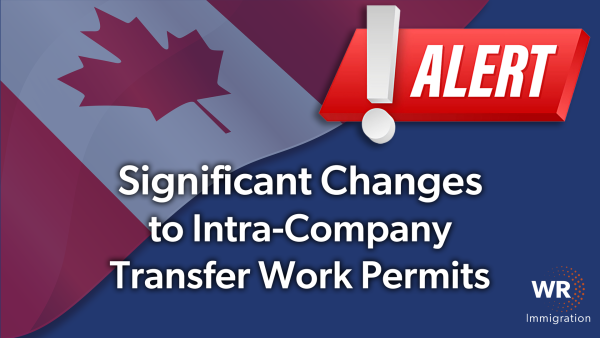Canada has just made significant changes to the requirements to qualify for an intra-company transfer (ICT) work permit. This will have a major impact on many companies seeking to employ foreign national workers in Canada. Note that workers who are citizens of a country that has a free trade agreement with Canada will not be directly impacted by these changes. A list of free trade agreement countries is included at the end of this alert.
- Company requirements – To sponsor workers for ICT work permits companies must now meet the following requirements:
- Have offices in at least two countries other than Canada – The company seeking to transfer the worker (the “sending company”) must be a Multinational Corporation (MNC), meaning it must have business operations in at least one country other than its home country. Canada does not count, so this means companies must have an office in their home country, in Canada and in a third country.
- Have physical office space in Canada – The Canadian company that will sponsor the worker (the “receiving company”) must have physical business premises where the transferred worker can work. Hybrid work and work at client premises appear to be permissible so long as the worker also reports to a physical office. Businesses with no physical premises in Canada are no longer eligible to sponsor workers for ICT work permits. Home offices, shared co-working spaces and mailing offices are not sufficient.
- Be actively engaged in business – The companies involved in the transfer must be actively engaged in business and have ongoing business operations. This means they must be doing business on a regular and systematic basis and must be continuously providing goods or services.
- Two years of specialized knowledge experience – Workers seeking an ICT work permit under the specialized knowledge subcategory will usually need to demonstrate that they have acquired the specialized knowledge relevant to the position they will fill in Canada over a minimum of two years working with the sending company outside Canada.
- Same position – The position with the Canadian receiving company must be the “same” position with the worker holds with the sending company. Previously it was sufficient if the position was merely “similar.”
Exemption – Workers who are citizens (or permanent residents, where noted) of the following countries are exempt from these changes on the basis of free trade treaties with Canada, although it is possible that we will see some increased scrutiny on applications across the board:
- Australia (citizen or permanent resident)
- Brunei
- Chile
- Colombia
- European Union Countries
- Japan
- Malaysia
- Mexico
- New Zealand (citizen or permanent resident)
- Peru
- South Korea
- UK
- USA
If you’d like to learn more, contact your WR Immigration attorney for guidance.


